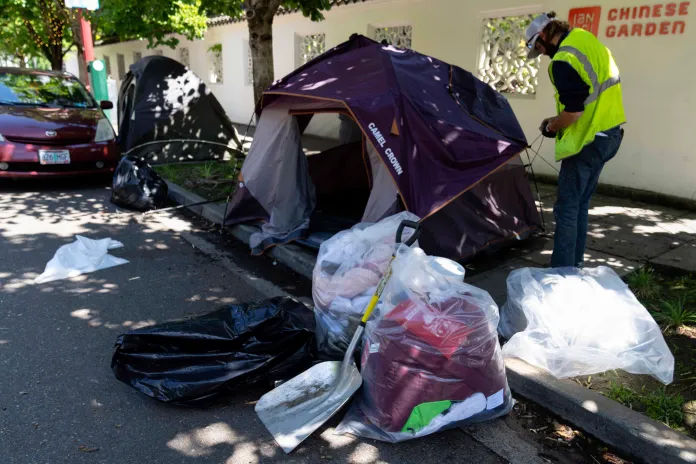PORTLAND, Oregon — The Portland City Council voted against a measure to halt homeless encampment sweeps during a contentious meeting, following a week of jabs between the Portland mayor and councilmembers who proposed the cuts.
Three hours of public testimony focused on the adverse effects of tent camping in the city on businesses and public health, emphasizing the need to protect children and parks from the presence of tents and drug use. Most urged the City Council to vote no.
The amendment, proposed by Councilwoman Angelita Morillo, would have cut $4.3 million from Portland’s Impact Reduction Program. The city initiative cleans and removes homeless encampments when they violate ADA requirements, block sidewalks or exits, have visible drug paraphernalia, violence, or criminal activity, are in close proximity to schools and playgrounds, or have become hazardous. Morillo’s amendment would have transferred $1.5 million for rent assistance, food aid, and the growing illegal immigrant population in the city ($500,000 each).
Portland Mayor Keith Wilson released a public letter opposing the proposal, encouraging people to sign up to testify against stopping the sweeps.
Kara Shane Colley, a board member of the small nonprofit organization Friends of Couch Park, said in her public testimony, “We see unhoused people continue to set up tents again and again, week after week, near Couch Park. If there is less money in the impact reduction program, does that mean that tents will stay up longer?”
The Friends of Couch Park was formed in 2023 when a man with a machete threatened people in the park, and a line of tents with open drug use was set up along the park. The park is also adjacent to the Metropolitan Learning Center, a local school.
“It is unacceptable to allow people to camp next to a school,” Colley said. “It is reasonable for the city to remove campsites next to a school. Like the unhoused population, children are also a vulnerable population, and they deserve protection.”
Sheila, an 80-year-old resident of Old Town, told the Washington Examiner, “With the tents and the garbage and the feces that [the homeless encampments] give rise to, the sidewalks are often impassable.”

She and her husband, a disabled veteran, purchased their condo in Old Town in 2002 with the intention that, when they eventually became too old to drive, they could easily walk to grocery stores, doctor’s offices, and entertainment venues, and have easy access to public transportation.
“The public health issues of having garbage and feces everywhere, and because of the blocked sidewalks, we are often forced to walk in traffic lanes,” Shelia said. “Old people dodging cars is not a game we ever wanted to play.”
Shelia explained how unchecked homeless encampments have been affecting businesses.
“Lan Su Chinese Gardens and the Japanese American Museum of Oregon have lost an enormous amount of business because there is no parking available, with tents and garbage filling the sidewalks right up to the curb,” she said. “Many businesses have had to close, and it is now an employment desert.”
She also noted that Morillo’s amendment openly states that budget cuts would lead to the loss of 100 jobs.
John Collins testified that he was homeless for over a year, living in a tent under Morrison Bridge. The sweeps helped him regain his life.
“An outreach worker with CCC offered me a direct move into Multnomah Safe Rest’s Village, a tiny home, which I accepted, got clean, and started to rebuild my life,” Collins said. “You would think that, being homeless previously, I would be against sweeps. But if you’re having those services to support, I’m all for it. Without that, I would have never rebuilt my life.”
Collins now has a full-time job, is attending school to obtain his CDL license, and spends his free time approaching people on the streets, encouraging them to accept shelter.
“There are beds every day, an ample amount, and these places are safe,” Collins said. “I say, let’s get out there and liberate these people from an oppressive lifestyle, because we have the resources.”
In 2024, city data showed 8,303 campsites were removed and 6,180 tons of garbage were collected. This included picking up trash littered by homeless encampments, as well as needles and other hazardous materials found in public parks and along city streets. Last year alone, the job cost the city $12,863,749.
However, not everyone agrees with the sweeps and new camping ban put in place by Wilson.
“I am so f****** tired and I’m so f****** angry,” Keeley Higgins, a far-left activist, yelled into the microphone while wearing a mask and a kuffiyeh as a scarf. “F*** you, Keith Wilson. I know your privilege and your supremacy keep you from feeling shame, but rest assured, you will only be remembered, if at all, for your stupidity, short-sightedness, and twisted heart.”
Higgins continued her nearly five-minute, profanity-filled rant during public comment with a threat against the Portland mayor.
“I know this testimony won’t change your policy, Keith, but you need to know that we fucking see you and there will be no peace without justice,” Higgins said, taking aim at the Portland Police Department and Immigration and Customs Enforcement. “We have Nazis kidnapping our friends and family with impunity. We’re still sending approximately just millions to Israel from this city and state alone. We have our PPD indiscriminately murdering brown and black folks. Support Morillo’s amendment, defend your neighbors against sweeps. And finally, f*** ICE. F*** the PPD. Free Palestine.”
ANTIFA POSTS ‘HIT LIST’ IN PORTLAND TARGETING JOURNALISTS
City Council President Elana Pirtle-Guiney condemned Higgins’s expletive-filled testimony and asked for professionalism from future testimonies.
“I understand the heated emotions; it’s important to call out actions that are hard to see,” Pirtle-Guiney said. “But we need to do so, acknowledging that oftentimes children are watching.”
